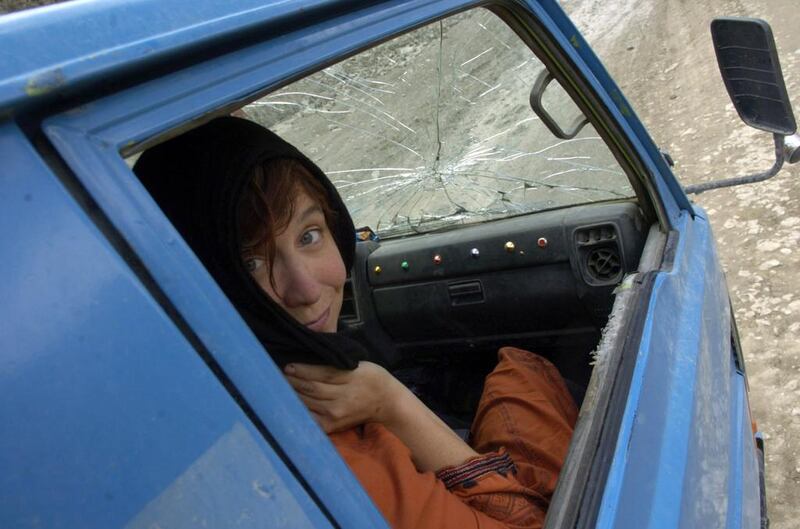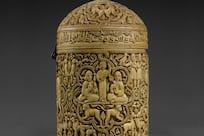In 2011, The New York Times' critic Michiko Kakutani reviewed The Taliban Shuffle, Kim Barker's memoir about reporting from Afghanistan and Pakistan for the Chicago Tribune. Praising Barker's style, which "manages to be hilarious and harrowing, witty and illuminating, all at the same time," Kakutani imagines our intrepid, if chaotic heroine as a "sort of Tina Fey character, who unexpectedly finds herself addicted to the adrenaline rush of war".
It would seem we can add clairvoyance, or at least amateur casting direction, to Kakutani’s other gifts. Barker’s memoir has now been filmed starring, you guessed it, the actual Tina Fey.
With a film due to hit the big screen in April, Barker's book has been re-released under its cinematic title Whiskey Tango Foxtrot. It's a cheeky joke: military code for the expletive usually rendered as 'WTF', which provides a strong hint of the mood of the early chapters.
The story starts in 2003. Barker is a journalist in her early 30s living in Chicago, and to all intents and purposes settled: “I had a serious boyfriend, an aspiring screenwriter named Chris, and I was on the marriage and baby track. I had good friends and a comfortable life ...”.
Some part of her, however, is drawn to covering the post-September 11 invasions of Afghanistan and Iraq. Born and raised in Montana, Barker describes her formative character as “sheltered” and “not brave”.
Her knowledge of world events is restricted to comparing Ayatollah Khomeini to Darth Vader; her experience of foreign affairs amounts to press trips to Jordan and Egypt: “I spoke only English. I knew little about Al Qaeda or Osama bin Laden. I knew as much about Islam as I knew about Christianity, given my hippie upbringing.”
Recent books by women journalists and photographers (for example, Lynsey Addario's excellent It's What I Do) have made accounts of women working in a war zone feel increasingly familiar: confronting misogyny both home and abroad, learning to cope with a seemingly endless round of sexual harassment. Nevertheless, it is still sobering to read Barker's selection process. "I have no kids and no husband, so I am expendable," she tells her boss, who replies: "We know who you are ... Get ready to go to Pakistan."
Barker’s first experiences prove underwhelming. She recalls, a little mournfully, reporting on elections in Iran, writing a “vague story about Islam” in Indonesia, and “rambling around Afghanistan” as the United States invaded Iraq. Anti-climactic or not, these assignments proved life-changing: “... I had caught the bug. What better job could there be than working halfway around the world from my bosses, than being paid to travel?”
The early chapters detail a tug-of-war between Barker’s old and new worlds. Her American existence is personified by Chris, her would-be writer boyfriend who moves to her base in Delhi to be near her.
The relationship is quickly strained, partly because Chris struggles to adapt, partly because Barker adapts so quickly. Easing her into the strange land is her invaluable guide Farouk, who trained as a surgeon but became Barker’s ‘fixer’; who interprets the language, customs and people she encounters.
During a meeting with Pacha Khan (Zadran), Farouk provides a crash course in etiquette advice about how an American ought to behave in the presence of a warlord. When Barker complains about Farouk’s unethical decision to describe her as Turkish, he shoots back: “I don’t think it is safe to say you’re an American. The Americans just killed his son. Trust me. I know Afghans. I know what I’m doing.”
The slangy swing of the opening (“Pacha Khan-istan”) sets the tone. Barker is a bright and breezy narrator, quite happy to combine reporting on a suicide bomb in Kabul, encounters with Zalmay Khalilzad (then US Ambassador to Afghanistan) and the cosmetic challenges of life near the frontline. “I had not really taken care of myself since coming overseas. I hadn’t had a haircut in five months, and my split-ends and slight curl gave me a frizzy aura. In my chronic hair wars, my grey roots were overtaking my brown ends.”
Walking the tightrope between the personal and political, the comic and tragic, the superficial and profound, the American and Afghan proves a delicate and risky business. As Barker puts it herself: “I couldn’t seem to separate work and life because there was no real division.” The very next sentence offers an example: “My job was the international equivalent of the police beat, and something was always going boom.” Is this darkly funny or, in a country where bombs kill people every day, a little glib?
Barker’s evident respect for the people caught in the violence rubs up against her professional ambition to get the story and her personal desire to have the semblance of a good time. Invited to her first Thursday-night Kabul party, a “seminal event”, she realizes that “against all logic, a social life in a war zone seemed entirely plausible”.
The defiant quest for pleasure is entirely understandable given the least pleasurable context imaginable. How else does one get through the day when it involves inspecting the decapitated head of a suicide bomber who attempted to kill Benazir Bhutto (Pakistan prime minister); wearing a burqa to avoid kidnap (or worse); or trying to talk your boyfriend out of a reckless meeting with Jalaluddin Haqqani, leader of “the most ruthless, sophisticated and evil of all the [Afghan] militant factions”.
Throwing herself into the decadent social whirl of the “Fun House”, an alcohol-fuelled den of iniquity formed by expatriates (lawyers, journalists, UN workers et al.) in “adversity”, and which Barker says “interrupted the monotony of life in Afghanistan like a sharp kick to the kneecap”.
Comedy also has serious purposes in the memoir – dedicated to "the people of Iraq and Afghanistan – who are still waiting for the punchline". Barker tilts at something like the anarchic satire of Joseph Heller's Catch 22, Robert Altman's MASH or Robert O'Connor's Buffalo Soldiers.
Arriving at the scene of a terrorist bombing, she asks a BBC reporter what it’s like: “Gooey” came the reply. “Doctors, journalists, police, soldiers – we all relied on black humour. Still I was unused to major suicide attacks, and his joke made me cringe.”
That’s the risk of jokes, and some of Barker’s sound odd notes. Of an American military Operation called Mountain Thrust she says: “with a name like that, I knew I had to get some”. Elsewhere, she compares the Taliban to “mosquitoes, constantly irritating, occasionally fatal”.
Then again, there is no place for nicety in war zones and Barker is pleasingly honest about her complicity in the contradictions she records. “It was a place to escape, to run away from marriages and mistakes, a place to forget your age, your responsibilities, your past, a country in which to reinvent yourself.”
Barker accepts and critiques her own attraction to the Middle East: “Not that there was anything wrong with that, but the motives of most people were not likely to help a fragile and corrupt country stuck somewhere between the seventh century and Vegas.”
That she resolved these tensions and emerged from near-collapse is admirable indeed. “I had no idea that I would find self-awareness in a combat zone, a kind of peace in chaos. My life here wouldn’t be about a man or God or some cause. I would fall in love deeply, but with a story, a way of life. When everything else was stripped away, my life would be an addiction, not to drugs, but to a place. I would never feel as alive as when I was here.”
While I don't doubt the intensity of Barker's experience – the depth of her empathy and despair – this comes perilously close to portraying the war in Afghanistan as a personal therapeutic finishing school. Luckily, her vibrant prose and sense of humour just about maintains the balance, ensuring that Whiskey Tango Foxtrot is a sharp and entertaining addition to the growing body of work by modern war correspondents.
James Kidd is a freelance reviewer who lives in London.





